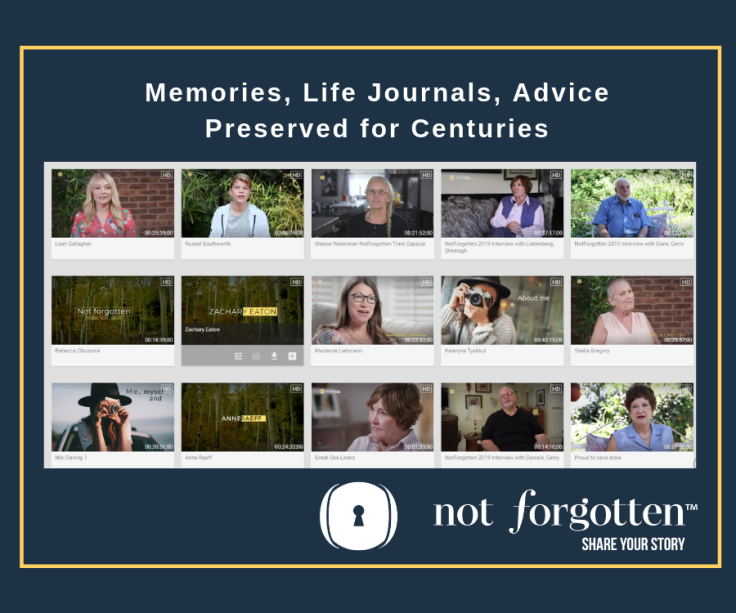New Tech, NotForgotten, Enables Users to Immortalize Themselves in Blockchain for up to 300 Years

Humans no longer have to fear being forgotten after death with the launch of NotForgotten, a company that offers immortalization in the form of digital time capsules.
Using blockchain technology, personal genealogy records, and WorldCat, users can create their own digital time capsule, each with a storage option for specified periods of 50, 150, or 300 years.
Every human has a unique story, and no one wants to be forgotten, particularly after death. In fact, many fear the idea of dying without leaving their mark on the world or a message for future generations. There’s even a name for it: athazagoraphobia. Countless generations have tried to fight this fear by leaving a piece of themselves behind for later generations - usually in the form of time capsules.
Time capsules, as they’re classically known, are airtight, element-proof containers usually filled with mementos chosen to reflect the time and place in which they were sealed inside. These physical capsules, while great in theory, have their limitations. Over time, elements take their toll on these capsules, and, usually, if not always, time and the elements get to the contents - destroying them, and the very reason they were created in the first place.
“Every human has a unique story and no one wants to be forgotten, particularly after death,” says Adrienne Liebenberg, Co-Founder of NotForgotten. “We wanted to give people the option to leave a record of themselves and a message for the generations coming after them.”
“Imagine: It’s the year 2319, you receive a will that includes log-in instructions for the bequeather’s accounts. One is for NotForgotten. You log in and find a collection of perfectly clear videos, created 300 years in the past, offering not only a glimpse of what life was like in 2019, but also a message with advice and family history from your ancestors,” adds Liebenberg.
NotForgotten works by using the latest in blockchain technology, personal genealogy records and WorldCat, a global catalog library, which enables users to collect and store their memories in digital time capsules. The technology gives users the ability to capture stories, significant life events and journal about their experiences through the NotForgotten app.
This data is then stored within Ethereum contracts - a blockchain innovation - for specified periods of 50, 150, or 300 years.
“Anyone can make a video, but to preserve it, properly store it, and ensure it can easily be found in 300 years is a challenge. So we assembled a team of archivists, genealogists, technologists and videographers with a purpose to leverage technology to capture, store and protect the wisdom of the living world, so future generations can understand and learn from their ancestors like never before,” Liebenberg says.
One user, Heather Gane, a 70-year-old genealogy enthusiast from South Africa and a NotForgotten user says, “After years of working on researching my family history, publishing three books on my family line and creating a memory book for my grandchildren to document their experiences, I found NotForgotten. It’s added a whole new dimension to family history research, capturing the essence of self that can’t be found in written records.”
The NotForgotten app gives users access to inspirational templates and a stunning video platform which enables users to create professional-looking records without a camera crew. The time capsule kits are delivered in a folder with pages including a family tree scrapbook, wills bequeathed, and a NotForgotten certificate.
“Essentially, it’s an easy-to-use tool that brings my - and my family’s - history to life, beyond the faded photos and vital records. I also don’t need to worry about storing them in my home and the records being lost when I pass,” Heather adds.
NotForgotten is backed by an enduring Digital Preservation Trust and Guarantee Fund, which working together with an official library entity, ensures the data will be stored securely and be freely accessible for up to 300 years.
“Abiding by world-class archiving and metadata standards, NotForgotten transcribes and encodes videos and records before copies are stored in two separate locations in the United States, on two types of media for maximum security and to combat data rot,” continues Liebenberg.
Data rot is the slow deterioration of storage media until data is no longer readable. To combat data rot, storage media and atmosphere conditions have to be near-perfect.
Classified in legislation as a ‘cultural monument’, the NotForgotten library of human experience intends to, over time, become a public resource which can be recorded, accessed and researched over the next few centuries.
AI integration is also on NotForgotten’s horizon, with Liebenberg stating, “Our ambition for the NotForgotten library is to utilize artificial intelligence to create additional knowledge and learning about humans at a time and place in history - analyzing what made them happy, how they interpreted major events, and how times have changed.”
“When users are contributing to NotForgotten, they’re also contributing to a future, accurate record of history that will be studied for generations to come. It’s hard to imagine what life will be then, but NotForgotten allows us to show them what life is like now,” Liebenberg states.




















